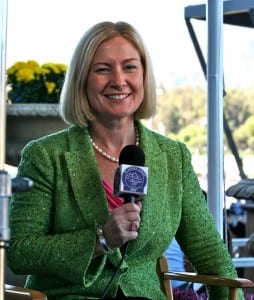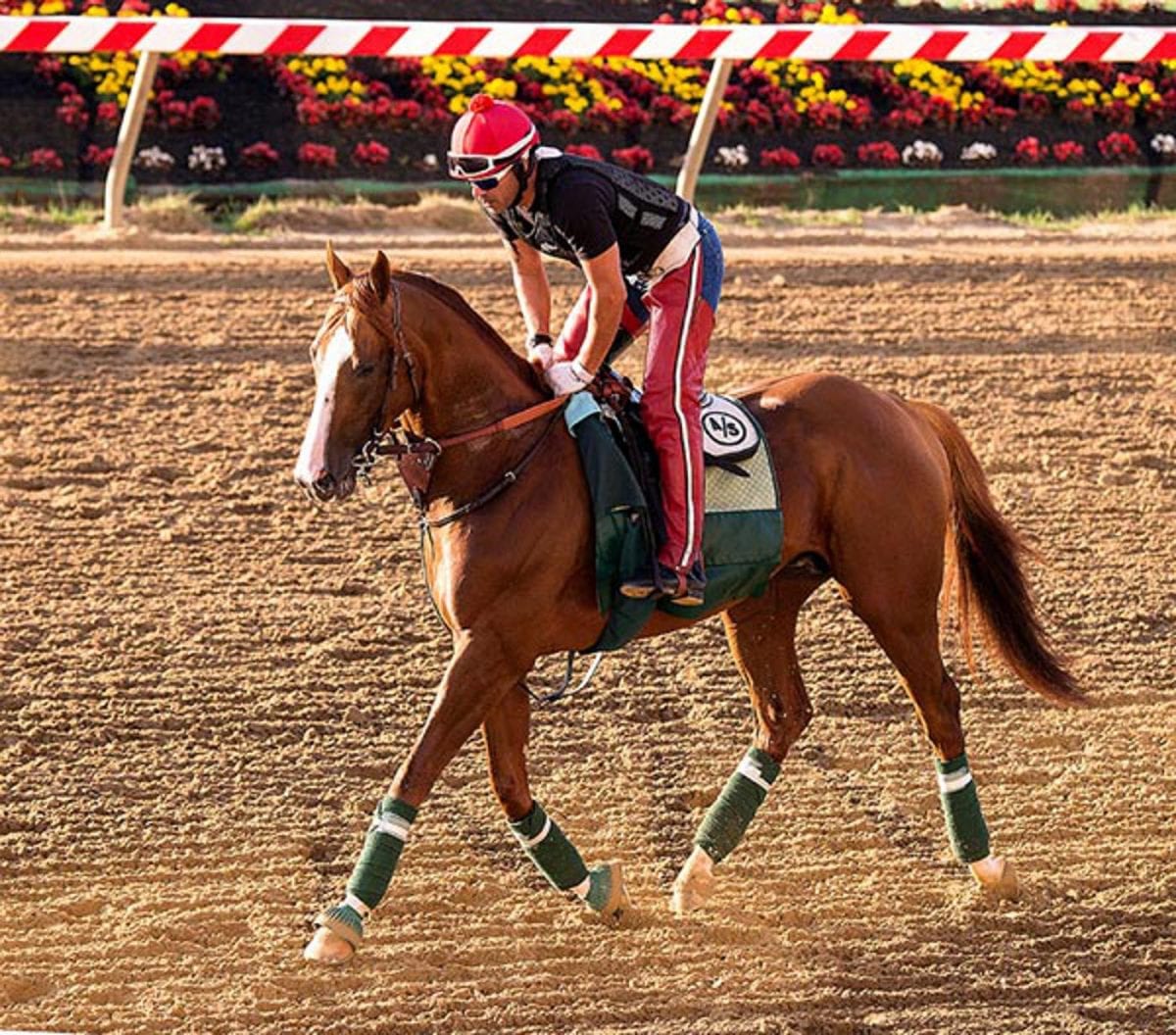On several recent weekends, Pimlico’s racing has been featured on HRTV. The face of HRTV at Old Hilltop — and at many other racing venues — is award-winning journalist Caton Bredar. We sat down with Caton earlier this week to discuss her career and her take on the Preakness and racing in general.

Caton Bredar, here at last fall’s Breeders’ Cup, has been the face of HRTV at Pimlico in recent weeks.
THE RACING BIZ: You showed horses and did jumping as a kid, but is it fair to say your roots were pretty firmly in the racetrack world growing up?
CATON BREDAR: I was a racetrack rat. When I was born, my dad was a schoolteacher, but he trained a couple horses on the side. He quickly moved out of that and took a job as farm manager at a farm… in Libertyville (Illinois). We weren’t there for that long but my earliest years and earliest memories are being on the horse farm and also being with him at the track, or anything with horses. Plus, my grandfather – my mom’s father – was Ted Atkinson, the Hall of Fame jockey who at that time was a state steward.
TRB: Was there a particular moment for you when it clicked that the racetrack was really in your future?
BREDAR: I always liked the track but was having a little bit of a tough time at school, not as far as grades but as far as fitting in, and it wasn’t my crowd of people as much.
I was more involved in horse stuff than I was in school stuff, and my dad said, “Why don’t you come to the track and start gettng on some horses there?”
I wasn’t 16 yet. I would get on a couple of horses in the morning before school. But I got called in [to the stewards] a week before my 16th birthday. I had to go in and they said, “You have to wait a week and then you can come back and get your license.”
I’d gotten ruled off for a week. But I think that my grandfather enjoyed that I liked horses and liked riding.
Plus I realized that you get paid. I’d worked so hard to ride, where, in the show horse business, you pay a lot of money to compete in shows. And you come to the racetrack — I’ll never forget the day I got on some horses, and the trainer, who was a friend of my dad’s — but I cleaned a couple stalls and did a bunch of different things — he gave me a $100 bill. And I’m like, “This is greatest game in the world… you mean, I get paid to ride?”
[pullquote]And I’m like, “This is greatest game in the world… you mean, I get paid to ride?”[/pullquote]
TRB: Given your background, it looked as if you might become a trainer, but those plans got derailed. What happened?
BREDAR: I did have my trainer’s license. I might have had one winner in my name; I’m not even sure I had that. The first day, I realized how much pressure there is in terms of answering to owners and how many things can go wrong when you’re in the barn. It wasn’t the work, and it wasn’t the horses. But it was sort of the what-all-else the job entails. I knew the first day, I had all the horses in my name, and we ran a horse, and the help didn’t show up, the horse didn’t run as well as expected, and the owners were disappointed. I thought, “This is not even remotely fun. There’s no way I want to do this for the rest of my life.”
TRB: A couple of twists and turns later, you end up a racing journalist. Are there any moments that stand out to you as particularly fun or moving or strange?
BREDAR: What’s funny is, before HRTV, I worked for TVG and when I first started, we covered Thoroughbred racing, but we also covered whatever else was happening at the track. Somebody said recently, “I just saw you the other day, they did a classic rewind, and you were covering a mule race.”
I said, “Black Ruby and Taz, right?” I covered weiner dog races. We covered the mules, which were really big in Califonrnia at that time.
In terms of a favorite moment, it always becomes more personal. You get really attached to horses and to people, so the more you get to cover them, the more … for me one of the best things was when Volponi won the Breeders’ Cup Classic. I was very close to [trainer P.G. Johnson and] the Johnson family. To see someone in kind of the twilight of his career, that’s a Hall of Famer, that comes back to his hometown, and to did it the way he did it, so unexpectedly, and so few people really thought he would win. He was 40-1 and P.G. had a lot of confidence in the horse. It was a cool moment.
TRB: And now we’re at the Preakness. How is it different for you coming to Baltimore to cover the Preakness versus being in Louisville for the Derby or New York for the Belmont?
[pullquote]There’s more of a focus on the Preakness horses themselves. At the Derby, even though it’s all about the Derby, it’s sort of about the mint juelps and the hats and the Derby and the celebrities. But this one is different.[/pullquote]
BREDAR: In general, it’s different and fun to get to come back. I guess because it’s not home base, in a way it’s a little bit more exciting and little bit more fun. This is more – I don’t want to say relaxed, because there’s defintiely an energy – the Derby’s frenetic, it’s how much can you cram in there in how many working hourse are there in terms of how much work and how many horses. This is a bit more controlled and a little bit less of a crazed pace because you’re dealing with a little bit smaller number of horses and you already have a sense of what’s going to happen as a result of the Derby, and that part makes it to me a lot more fun in a way. At the Derby, you’re just so busy trying to get yourself up to speed on every single thing, and here now, they’re all old friends.
And a lot of the people who come here have never been to Pimlico before, and that part of it is kind of exciting and fun too, because they all sort of enjoy the atmosphere, the fact that it’s one barn, the fact that there’s more of a focus on the Preakness horses themselves. At the Derby, even though it’s all about the Derby, it’s sort of about the mint juelps and the hats and the Derby and the celebrities. But this one is different.
TRB: So, the big question: Who wins on Saturday?
BREDAR: I’m expecting that California Chrome will win. I mean, there’s a million intangibles for every race, but he has probably had the easiest time of it going through his campaign. He’s the only consistent entity of the entire year. The three year-olds have kind of failed to distinguish themselves with the excpetion of him. At this point, no one that’s running has shown that they’re anywhere near as consistent or as good and able to handle all the new things that get thrown at him. Barring something unusual, I think he probably will win this. The horses that are new shooters will probably give him the biggest run for his money. I think Social Inclusion is a really nice horse. I wish though he wasn’t dealing with a long time between races and the bruised foot. And Bayern — California Chrome’s kind of proven he’s better than Bayern. And Ria Antonia, she was no match for the girls. I know people are a concerned about the pace, but I belive a bit more pace actually helps him because he’s already shown he doesn’t have to be right on the lead. He has tactical speed, and now to be able to get a position and now just switches it off to be able to stay in that position, and has that turn of foot that I think has been more effective than anybody else we’ve seen this year. I don’t see how you beat him.
(Featured image, of California Chrome, by Jim McCue, Maryland Jockey Club.)








Caton Bredar is the best! Her intelligence combined with her knowledge of the racing industry makes her interviews and comments stand out. She is a “pretty face” but she is much more. The horse racing broadcast industry is lucky to have her.